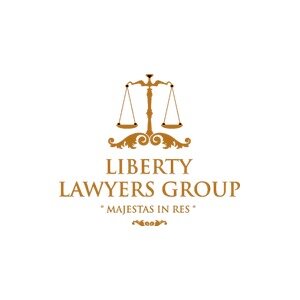Best Structured Finance Lawyers in Moscow
Share your needs with us, get contacted by law firms.
Free. Takes 2 min.
List of the best lawyers in Moscow, Russia
About Structured Finance Law in Moscow, Russia
Structured finance refers to a complex area of finance dealing with the pooling of financial assets and the creation of securities based on those assets. In Moscow, Russia, structured finance typically involves instruments like asset-backed securities, collateralized debt obligations, and securitizations. The legal framework in Moscow is influenced both by Russian federal regulations and by international financial practices, given the increasing globalization of financial markets.
Common transactions that fall under structured finance include the structuring of loans, securitization of receivables, and the use of derivatives for risk management. Russian legislation continues to evolve in this field, aiming to create a favorable climate for investors, issuers, and other market participants in the capital markets.
Why You May Need a Lawyer
Structured finance transactions are multifaceted and often involve considerable legal and financial risks. You may require a specialized lawyer in situations such as:
- Structuring or issuing securities backed by assets
- Dealing with cross-border investments or foreign partners
- Drafting or negotiating complex financing agreements
- Complying with Russian and international regulatory requirements
- Addressing legal due diligence for major financial deals
- Navigating issues related to bankruptcy or insolvency in structured deals
- Managing risks associated with derivatives or swaps
- Resolving disputes related to structured financial products
- Ensuring tax compliance in complex financing structures
Legal advice helps mitigate risks, ensures compliance, and protects your interests throughout the transaction process.
Local Laws Overview
Structured finance in Moscow is governed by a mix of federal laws, Central Bank regulations, and civil code provisions. Key legal aspects include:
- Securitization Regulations: Russian law allows for the securitization of various asset classes, including mortgages and receivables, subject to strict registration and disclosure obligations.
- Special Purpose Vehicles (SPVs): SPVs are commonly used in structured finance. Russian law specifies how these entities must be established and operated to ensure the legal isolation of assets.
- Banking and Capital Markets Oversight: The Central Bank of Russia regulates most aspects of structured finance, including licensing for originators and investors.
- Tax Considerations: Tax treatment of structured finance products is defined in both the Russian Tax Code and by specific regulatory guidance.
- Bankruptcy and Insolvency: Russian insolvency law contains special provisions for dealing with structured products and the protection of secured creditors.
Local laws are continuously evolving to keep up with the demands of the financial sector, which makes specialized legal advice crucial.
Frequently Asked Questions
What is the primary role of structured finance in Russia?
Structured finance enables companies and banks to access capital while transferring risk, usually through the securitization of assets or complex financing arrangements.
What are the most common structured finance products in Moscow?
The most common products are asset-backed securities, mortgage-backed securities, syndicated loans, and various derivatives.
Do Russian laws allow for cross-border structured finance deals?
Yes, but they are subject to foreign exchange controls, disclosure requirements, and cross-jurisdictional legal compliance.
Are there any restrictions on foreign entities investing in structured products in Russia?
Foreign entities can invest, but they must comply with Russian securities regulations and may face limitations in certain strategic industries.
What is the typical legal structure for securitization in Russia?
Securitizations often use a Special Purpose Vehicle, which purchases assets and issues securities backed by those assets.
How are SPVs regulated under Russian law?
SPVs must be registered entities in Russia, and their activities, management, and accounting are subject to strict rules to ensure transparency and legal separation of assets.
What are the key risks in structured finance transactions?
Key risks include legal enforceability, insolvency, regulatory changes, and counterparty credit risk.
Is it necessary to conduct due diligence before entering a structured finance deal?
Yes, thorough legal and financial due diligence is essential to assess risks, verify asset quality, and ensure compliance with Russian law.
How are disputes in structured finance typically resolved?
Disputes can be resolved through negotiation, Russian courts, or international arbitration, depending on the contractual agreement.
What government body oversees structured finance in Russia?
The Central Bank of Russia acts as the primary regulator, overseeing registration, disclosure, and compliance for most structured finance products.
Additional Resources
For those seeking more information or official guidance on structured finance in Moscow, the following resources may be helpful:
- Central Bank of Russia - Regulatory guidance and licensing information
- Moscow Exchange - Data and rules on securities and listings
- Federal Tax Service - Information on tax aspects of structured finance
- Russian Ministry of Finance - Updates on relevant laws and legislative proposals
- Russian Arbitration Center - Dispute resolution for complex financial transactions
Next Steps
If you need legal assistance in structured finance in Moscow, consider the following actions:
- Identify the nature of your transaction and any specific legal or regulatory issues involved
- Gather all relevant documentation and financial details regarding your project or transaction
- Search for a reputable law firm in Moscow specializing in structured finance and capital markets
- Arrange a consultation to discuss your needs, the risks involved, and the expected timeline
- Work with your lawyer throughout the structuring and closing of your transaction to ensure regulatory compliance and risk mitigation
It is important to engage experienced legal counsel early in the process to avoid costly mistakes and ensure that your transactions comply with all local laws and regulations.
Lawzana helps you find the best lawyers and law firms in Moscow through a curated and pre-screened list of qualified legal professionals. Our platform offers rankings and detailed profiles of attorneys and law firms, allowing you to compare based on practice areas, including Structured Finance, experience, and client feedback.
Each profile includes a description of the firm's areas of practice, client reviews, team members and partners, year of establishment, spoken languages, office locations, contact information, social media presence, and any published articles or resources. Most firms on our platform speak English and are experienced in both local and international legal matters.
Get a quote from top-rated law firms in Moscow, Russia — quickly, securely, and without unnecessary hassle.
Disclaimer:
The information provided on this page is for general informational purposes only and does not constitute legal advice. While we strive to ensure the accuracy and relevance of the content, legal information may change over time, and interpretations of the law can vary. You should always consult with a qualified legal professional for advice specific to your situation.
We disclaim all liability for actions taken or not taken based on the content of this page. If you believe any information is incorrect or outdated, please contact us, and we will review and update it where appropriate.

















